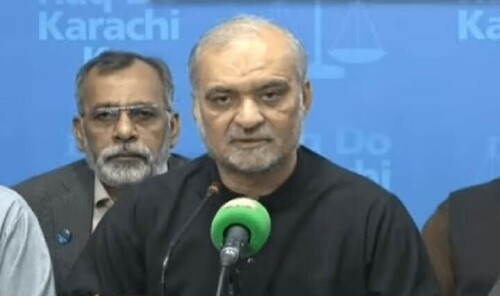WASHINGTON, April 7: The United States said on Monday that military sales and economic assistance to Pakistan would continue despite recent sanctions.
“The sanctions are only specific to KRL, which does not buy anything from the United States,” a State Department official told Dawn.
On March 24, the United States imposed two-year sanctions on the Khan Research Laboratory (KRL) and the Changgwang Sinyong Corp of North Korea. These restrictions debar the companies from any trade or technological exchanges with governmental and non-governmental entities in the United States. The sanctions were imposed as a penalty for what the US officials said a clandestine missile-supply relationship between the two firms.
“The sanctions will not affect defence sales which take place in support of operation enduring freedom,” said the official who cannot be identified because of State Department rules governing such interviews. “The US economic assistance will also continue,” he added.
Commenting on media reports that Pakistan had purchased missiles from North Korea as late as last month, the official said he could not verify “the truth in such reports.”
The sanctions, he said, were “not over transactions in March.”
Commenting on a recent statement from New Delhi that India reserved the right to launch a pre-emptive attack in Kashmir as the Americans did in Iraq, the State Department official said: “Attempts to draw parallel between Iraq and Kashmir are overwhelmed by differences between the two situations.”
“We recognize the very serious nature of the situation in Kashmir as our recent joint statement with Britain made clear but the two situations were not comparable.”
Explaining the difference between the two situations, he said: “Iraq invaded, occupied and brutalized Kuwait in 1990. The international community came together to drive Iraq out of Kuwait the following year. A decade earlier Iraq attacked another neighbour, Iran, and used chemical weapons against it, and against thousands of its own citizens.”
The US and coalition allies, he said, had taken action against Iraq only after 12 years of UN Security Council resolutions, including resolution 1441 which was approved by 15-0, failed to achieve Iraq’s disarmament.
“These circumstances, which made the coalition actions necessary in Iraq, do not apply in the subcontinent and should not be considered a precedent,” the spokesman warned.
“We have not seen anything like that in the subcontinent,” he added when asked to further elaborate differences between Kashmir and Iraq.
The spokesman said infiltration in Kashmir was a serious issue. “It has not stopped as yet and it is something we have said needs to stop.”
The State Department official said the US was working with Pakistan to stop infiltration.
He said the United States took India’s threats of war seriously and was “in pretty regular touch with both the governments to ensure that the situation does not get out of hand.”
“Threats of war are always something taken seriously,” he added.












































Dear visitor, the comments section is undergoing an overhaul and will return soon.